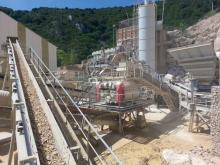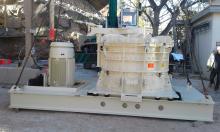The prestigious prize was awarded by the German Federal Minister for Economic Affairs and Energy to the two companies to commend the development and successful implementation of the Combimix process. This process turns a previously worthless mining by-product accumulated in quarries into a valuable building resource.
BHS developed the Combimix process based on its twin-shaft batch mixers and implemented it together with MSW at its quarry in Mönsheim.
This marked the first German project of this kind. It helped to increase raw material efficiency from the previous level of 65-70% to around 93%.
In quarries and gravel pits, the Combimix process takes clay and rock mixtures, which previously had to be refilled or disposed at a landfill, and turns them into a marketable building material. Furthermore, this means that millions of tonnes of material previously considered worthless and dumped can now be reactivated.
BHS has also installed the Combimix system in several quarries in France using continuous mixers. Before the system was installed, in one facility more than 100,000tonnes of rock/clay mixture from the quarry had to be dumped every year. More than 90% of contaminated feed material is now sold as rock grade thanks to the Combimix system.
“Before the mixer was installed, we had to break down 400,000tonnes of rock each year to obtain 300,000tonnes of salable material,” says the plant manager.
“The new procedure means we only require 330,000tonnes to achieve the same delivery quantity.”
The German Federal Ministry for Economic Affairs and Energy (Bundesministerium für Wirtschaft und Energie) awards the German Resources Efficiency Award to exemplary products that efficiently use raw materials and other materials, processes or services, as well as application-oriented research results.
A jury comprising 14 members screened over 40 submissions to select four winners in the Companies’ category and a single winner in the Research Facilities category.
Andre Däschlein, director of international sales for mixing & crushing technology at BHS, and Benedikt Fahrland, managing director of MSW Mineralstoffwerke Südwest, accepted the award presented by Uwe Beckmeyer, Parliamentary State Secretary of the Federal Minister for Economic Affairs and Energy at the Efficient use of raw materials – Market success symposium.
A happy moment for Däschlein: “This award demonstrates yet again that deep industry know-how and close ties to their customers allow mid-sized companies, in particular, to create innovative processes and solutions that deliver true efficiency gains.”
Excerpt from the laudation of State Secretary Beckmeyer: “The sparing and efficient use of natural resources is a key skill needed to create a sustainable society. This year’s winning projects serve as role models of innovative and competitive industrial entrepreneurship in Germany. They furthermore pave our way to becoming less dependent on resource imports.”
MSW introduced the process at its Mönsheim quarry in the summer of 2016. It allowed the company to increase their repository’s yield by 25%. To produce the same volume of the final product, it was previously necessary to extract about 620,000tonnes of limestone annually. Now the total is around 188,000tonnes less, which corresponds to a relative reduction of around 30%. It helped to increase raw material efficiency from the previous level of 65–70% to around 93%.
Dennis Kemmann, managing director of BHS-Sonthofen, is already thinking ahead.
“Our Combimix process holds a vast potential as it enables companies across the globe and throughout various industries to utilise resources more efficiently.
“In the context of rehabilitating contaminated soil, Combimix can be used to remove oil and other harmful substances. As a result, only a small fraction of the feed material needs to be dumped in hazardous waste landfills.
“The process is also viable for the cement industry. Here, it can be applied to processing limestone, a key ingredient that improves the burning process in rotary kilns and thus contributes to reducing fuel consumption.”







